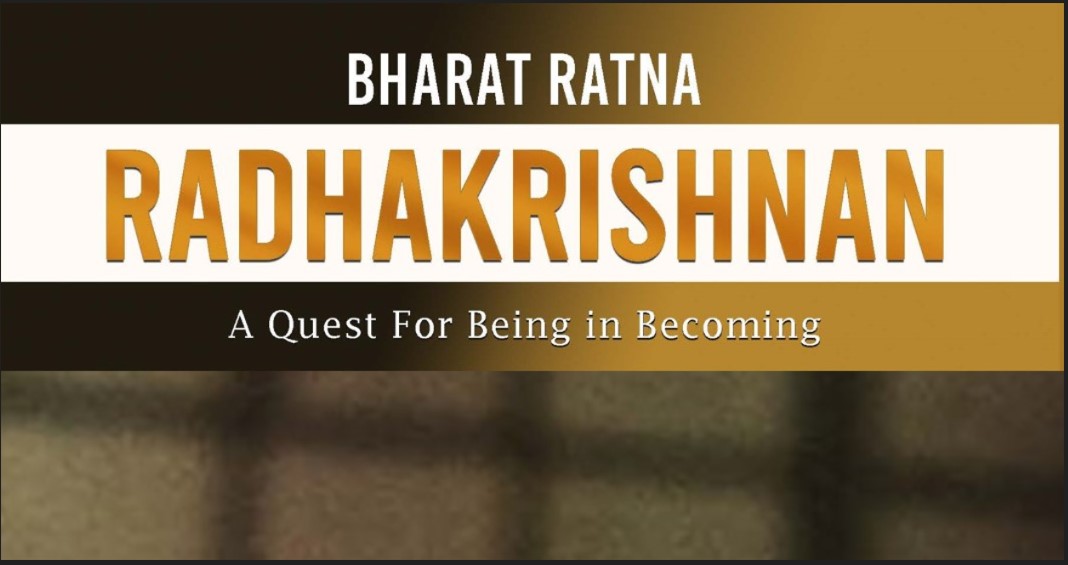Introduction
The philosopher, the second President of India and most importantly the great teacher, Dr S Radhakrishnan doesn't need any introduction. He was an eminent scholar and one of the prominent philosophers of the 20th century. Sarvepalli's bachelor's degree thesis was titled "The Ethics of Vedanta and its Metaphysical Presuppositions”. It was published at the age of 20 and he received tremendous accolades for it. He made a great contribution to the field of philosophy and bridged the gap between Eastern and Western ideologies. Other than that, his contribution to education, religion, and ethics and his integrated approach to these subjects continue to have an impact and inspire people who work to promote moral and spiritual values in society. The philosophical contents in his visualisation were very much embedded since his childhood and blossomed over the period of time. He chose metaphysics and religious philosophy for research purposes. He critically examined Indian philosophy and religion to determine what was live and dormant. Advaita Vedanta and the oneness of Atman and Brahman were focal points of his ideas on metaphysics. He emphasised the significance of moral principles that have a spiritual foundation in ethics. He praised Indian art and culture's spiritual and philosophical facets on an aesthetic level. The paper focuses on his contributions to metaphysics, ethics and aesthetics and their relevance in the field of Public Administration.
“It is the intense spirituality of India and not any great political structure or social organisation that it has developed that has enabled it to resist the ravages of time and the accidents of history.”- Dr. S Radhakrishnan.
Dr. S. Radhakrishanan was an internationally renowned philosopher and academician. A true believer in idealistic values, he represented Indian values and thoughts all over the world. Despite the one-sided ideology of Western philosophy, Dr. S. Radhakrishnan believed in integrating both Eastern and Western ideologies. It shows a congruency in bridging the gap between not only the east and west but also the rest. His books, such as "Indian Philosophy" and "The Philosophy of the Upanishads," presented straightforward explanations of complicated Indian philosophical principles, making them more understandable to a global readership. His works and ideas are still relevant and inspiring today's philosophers, politicians, administrators and researchers. The paper provides insight into the philosophy of metaphysics, ethics and aesthetics of Dr S. Radhakrishnan and how these ideas are useful in modern-day Public Administration.
Philosophy of Dr. Sarvepalli Radhakrishnan
Radhakrishnan's philosophy was deeply influenced by Mahabharata, Bhagwat Gita, Upanishads and also thinkers like Sankara and Ramanuja. He believed that his idea of Hinduism was universal and defended it against Western criticism. He reinterprets the Upanishads and Vedas and provides the world with a new wisdom of Hinduism both as a religion and a way of life.
Metaphysics
He regarded Hinduism as a scientific religion founded on facts rather than intuition or religious experiences. He explained that intuition is of the Savatassiddha (self-certifying) and Svasamvedya (self-evidencing) types, as well as the Swayam Prakash (self-luminous) type. He was a renowned Vedanta advocate who redefined Advaita Vedanta for a modern audience. Idealism underpins his philosophy (Kishore, 2021). Radhakrishnan was a devout Advaita Vedanta adherent. His works easily demonstrate the impact of Advaita philosophy. He not only reinterpreted but also reconstructed, Sankara's Advaita Vedanta philosophical theories through the lens of developing modern science and technology, as well as through the lens of Western ideology (Sharma, 2020). To Radhakrishnan, intuition is the pinnacle of experience. Intuition is the broadest and, consequently, most genuine realisation of the Real (Brahman), making it the ultimate realisation. Radhakrishnan explains intuition serves as the foundation for all other types of experiences.
Radhakrishnan's idealism acknowledged the actuality and diversity of the world of experience (prakti) while retaining the concept of a completely transcendent Absolute (Brahman), an Absolute that is equal to the self (Atman). While the world of experience and everyday things is not ultimate reality because it is subject to change and is marked by finitude and multiplicity, it does have its origin and support in the Absolute (Brahman), which is free of all limits, diversity, and distinctions (nirgua). Brahman is the source of the world and its manifestations, but these modes do not affect Brahman's integrity (Internet Encyclopedia of Philosophy (IEP, n.d.).
Radhakrishnan revised what he believed to be Sankara's view of Maya as solely an illusion. According to Radhakrishnan, Maya should not be interpreted to mean a rigid objective idealism, one in which the world is thought to be fundamentally separate from Brahman, but rather Maya denotes, among other things, a subjective misconception of the world as ultimately accurate (Braue, 1985).
Ethics
Character, the habit of will, is self-created rather than predetermined. "An action is good, not because of its external consequences, but on account of its inner will. Virtue is a mode of being and not of doing. It is not something to be found, but a function or an exercise of the will” (Radhakrishnan S., 1914). He rejected the concept of Dharma as in the West but interpreted it as a way of life. Radhakrishnan contends that there is a close connection between religion and ethics. Dharma is the culmination of religious and moral law. Dharma is simply a synthesis of ethics and religion (Naravane, 1964). Experiences with ethics had a profoundly transformational effect on Radhakrishnan. The experience helps to solve problems and bring seemingly opposing lines of action into harmony.
“Every form of life, every group of men has its ‟dharma, which is the law of its being. Dharma or virtue is conformity with the truth of things, and dharma is opposition to it. Moral evil is disharmony with the truth which encompasses and controls the world” (Radhakrishnan S., 1927).
His reformation of Hindu idealism is based on the ethics of action, which he derived from the Bhagwad Gita, Sikh philosophy, and Mahayana Buddhism. He pointed to the enduring spiritual principles promoted by Hinduism to attack the West's one-sided advancement in scientific and technological endeavours as well as its emphasis on pursuing comforts and pleasures. He did not believe that achieving the Western way of life was the pinnacle of human potential. Thus, for him, "the religion of the spirit" serves as the pivot around which all of his intellectual commitments revolve (Singh, 1988). Thus, he holds that ethics are extremely important in a man's life. It trains the human spirit and transforms him towards perfection.
Aesthetics
According to Radhakrishnan, aesthetics has profound philosophical and spiritual implications, especially in the context of Indian art and culture. Radhakrishnan states that "all art is the expression of experience in some medium" (Radhakrishnan D. S., An Idealistic View of Life, 1932).
Art becomes mechanical and a repetition of previous themes without the intuitive feeling. Instead of communicating the artist's intuitive encounter with reality, such "art" is an exercise in (re)production (Internet Encyclopedia of Philosophy (IEP), n.d.).
To Radhakrishanan, aesthetics is a synthesis of both arts and science. But still, there is some difference between them. He stated; "Poetry is the language of the soul, while prose is the language of science. The former is the language of mystery, of devotion, of religion. Prose lays bare its whole meaning to the intelligence, while poetry plunges us in the mysterium tremendum of life and suggests the truths cannot be stated” (Radhakrishnan D. S., An Idealistic View of Life, 1932).
Relevance to Public Administration
Dr. Radhakrishnan's philosophical views are directly related to the administration and ideal system of governance.
1. Impersonal motive: Selfishness should never be the driving force behind any action. No action should be taken out of self-interest or to fulfil one's desires. Reason teaches us that serving others is the highest goal, and reason must be used to determine what is right in every given situation. If our conscience leads us to believe something is right, we must do it while being well-equipped to handle fortune in all of its guises. We must behave impartially (Radhakrishnan D. S., Ethics of Vedanta, 1914).
2. Change orientation: Radha Krishna stated, “If the new harmony glimpsed in the moments of insight is to be achieved, the old order of habits must be renounced” (Radhakrishnan D. S., An Idealistic View of Life, 1932). Similarly, for growth and development administration should be adaptive to change.
3. Decision making: Dr. S. Radhakrishnan talked about the importance of decision-making based on intuition as well as codes.
4. Rules: Public Administration is governed by laws and codes code. Radhakrishnan freely acknowledges that established moral rules are the source of the vast majority of moral judgements.
5. Coordination: “Here we find the essence of religion, which is a synthetic realization of life. The religious man knows that everything is significant, the feeling that there is harmony underneath the conflicts and the power to realize the significance and the harmony” (Radhakrishnan D. S., An Idealistic View of Life, 1932). Similarly in Public administration harmony and coordination is important for smooth functioning.
6. Division of work: According to Dr S Radhakrishnan, knowledge acquisition is the obligation of the Brahman; protecting the weak is the duty of the Kshatriya; business and agriculture are the responsibilities of the Vaishya; and serving others is the duty of the Shudra (Radhakrishnan D. S., Bhartiya Darshan-I, 2004). This ancient principle of division of work is still relevant.
7. Science and Arts: The way Dr. Radhakrishanan viewed aesthetics as science and arts, “What the scientist does when he discovers a new law is to give a new ordering to observed facts. The artist is engaged in a similar task. He gives new meaning to our experience and organizes it differently due to his perception of subtler qualities in reality” (Radhakrishnan D. S., An Idealistic View of Life, 1932). Similarly, public administration holds art and science views. According to D. Waldo, Public Administration is art as well as science. Public administration is art because it is related to getting things done. Public administration is science as it observes, conducts research and uses data analysis for functioning.
8. The integrity of thoughts: Dr. S. Radhakrishnan emphasised on integration of both Western and Eastern ideology. Similarly in Comparative Public Administration, we compare two or more administrations and integrate the working of machinery for efficiency and effectiveness.
9. Importance of experience: Dr. S Radhakrishnan stated "Religion is a kind of life or experience. It is an insight into the nature of reality (darsana), or experience of reality (anubhava)" (Radhakrishnan S., 1927). Similarly, Personnel Administration emphasised experienced members at top-level management. Experience is necessary for the personal growth of any employee and it helps the organisation in the long term.
10. Logical knowledge: The philosophy of Dr. S. Radhakrishnan is that logical reasoning is obtained by the process of analysis and synthesis. He gave importance to logical knowledge for the working of rational systems. In the same way, public administration believes in logical reasoning and rationality.
Conclusion
It is not an unknown fact that Dr. S. Radhakrishnan has contributed immensely to the field of philosophy. His contribution in representing Indian ideology and thoughts can't be ignored. His ideas are relevant in every other field of social sciences. When Indian ideology was considered outdated and of no relevance, his reinterpretation of the Upanishads, Bhagavad Gita, Vedas and many ancient scriptures provided a modernised view of Indian ideology. Despite the criticism from Western ideologies, he emphasized on integration of thoughts. He reinterpreted Dharma as the way of life and mode of behaving. His works in ethics emphasised making man moral through logical reasoning, intuition, experience and following codes. This shows that his work still holds relevance despite being written in the 20th century. As such, the philosophy of Radhakrishnan unfolds many responses to unsolved problems of the day. His thoughts on education facilitate policymakers to design inclusive social policies on the one hand and embrace Hinduism as a religion turns out to be the guardian of gratitude and custodian of culture.
References
1. Braue, D. A. (1985). Māyā in Radhakrishnanʾs thought: six meanings other than illusion. Delhi: Shri Jainendra Press.
2. Internet Encyclopedia of Philosophy (IEP). (n.d.). Sarvepalli Radhakrishnan (1888—1975). Retrieved from Internet Encyclopedia of Philosophy (IEP) A Peer Reviewed Academic Resource: https://iep.utm.edu/radhakri/#SH2a
3. Kishore, P. (2021, 09 05). Dr Radhakrishnan: Messenger of Indian philosophy. The Sentinel. Retrieved from https://www.sentinelassam.com/life/dr-radhakrishnan-messenger-of-indian-philosophy-553455
4. Naravane, V. S. (1964). Modern Indian thought. New Delhi: Asia Publishing House.
5. Radhakrishnan, D. S. (1914). Ethics of Vedanta. International Journal of Ethics, 24, 174. Retrieved from https://archive.org/details/jstor-2376505/page/n15/mode/2up
6. Radhakrishnan, D. S. (1932). An Idealistic View of Life. London: George Allen & Urwin Ltd. Retrieved from https://archive.org/details/Sarvepalli.Radhakrishnan-An.Idealist.View.of.Life.1932/page/n3/mode/2up
7. Radhakrishnan, D. S. (2004). Bhartiya Darshan-I (Vol. 1). New Delhi: Rajpal & Sons.
8. Radhakrishnan, S. (1914). The Ethics of the Vedanta. The International Journal of Ethics, 24(2), 168-183. doi:https://doi.org/10.1086/intejethi.24.2.2376505
9. Radhakrishnan, S. (1927). The Hindu View of Life. London: Urwin Books.
10. Sharma, S. (2020, July). Radhakrishnan’s Perennial Philosophy of Religion. International Journal of Research in Humanities & Soc. Sciences, 8(7), 12-22.
11. Singh, D. G. (1988). Radhakrishnan as a Philosopher. In Dr. Sarvepalli Radhakrishnan A Commemorative Volume 1888-1988 (pp. 1-3). New Delhi: Princeton Hall of India Private Ltd. Retrieved from http://rsintranet.nic.in/intrars/Sarvapall.pdf



